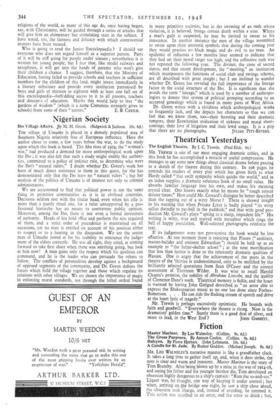Nigerian Society
Ibo Village Affairs. By M. M. Green. (Sidgwick & Jackson. 10s. 6d.)
THE village of Umueke is placed in a densely populated area of Southern Nigeria relatively free of European influence. Here the author chose to come, a few years before the war, to do the study upon which this book is based. The Aba riots of 1929, the " women s war," had produced a demand for more anthropological work upon the Ibo ; it was also felt that such a study might enable the authori- ties, committed to a policy of indirect rule, to determine who were the Ibo's "natural rulers." I doubt whether Dr. Green's work has been of much direct assistance to them in this quest, for she has demonstrated only that the Ibo have no "natural rulers " ; but her analysis of the politics of Umueke is of interest not only to colonial administrators.
We are accustomed to find that political power is not the same thing in primitive communities as it is in civilised countries. Decisions seldom rest with the titular head, even when his role is more than a purely ritual one, for a ruler unsupported by a pro- fessional hierarchy has no means to contravene public opinion. Moreover, among the Ibo, there is not even a formal investiture of authority. Heads of kin hold office and perform the acts required of them, and a strict order of precedence is maintained on all occasions, yet no man is entitled on account of his position either to respect or to a hearing in the discussion. We see the senior man of Umueke jeered at for his inability to announce the judge- ment of the elders correctly. He was all right, they cried, at coming forward to take first share when there was anything going, but look at him now! A man gains only the respect which his qualities can command, and he is the leader who can persuade the others to follow. The conflicts of personalities develop against a background of opposed segments of the community, and Dr. Green defines the forces which hold the village together and those which regulate its relations with other villages. We are shown the importance of magic in enforcing moral standards, not through the lethal ordeal found in many primitive societies, but in the swearing of an oath whose violation, it is believed, brings certain death within a year. Where a man's guilt is suspected, he may be invited to swear to his innocence. In another instance the men of the village assembled to swear upon their ancestral symbols that during the coming year they would practise no black magic and do evil to no man. An epidemic of influenza a few months later seemed to indicate that they had set their moral target too high, and the collective oath was not repeated the following year. The diviner, the caste of sacred slaves, and that recent development, the " meeting," an institution which incorporates the functions of social club and savings scheme, are all described with great insight ; but I am inclined to wonder whether Dr. Green has revealed the full importance of the lineage factor in the social structure of the Ibo. It is significant that she avoids the term " lineage," which is used by a number of anthropo- logists to denote that system of political grouping according to an accepted genealogy which is found in many parts of West Africa.
Dr. Green writes with a vividness which anthropological works so frequently lack, and she depicts her characters so that we can feel that we know them, too—their boasting and their dramatic tempers, their Erewhonian evaluation of sickness and moral short- comings, their love of litigation and their lewd songs. It is a pity


































 Previous page
Previous page